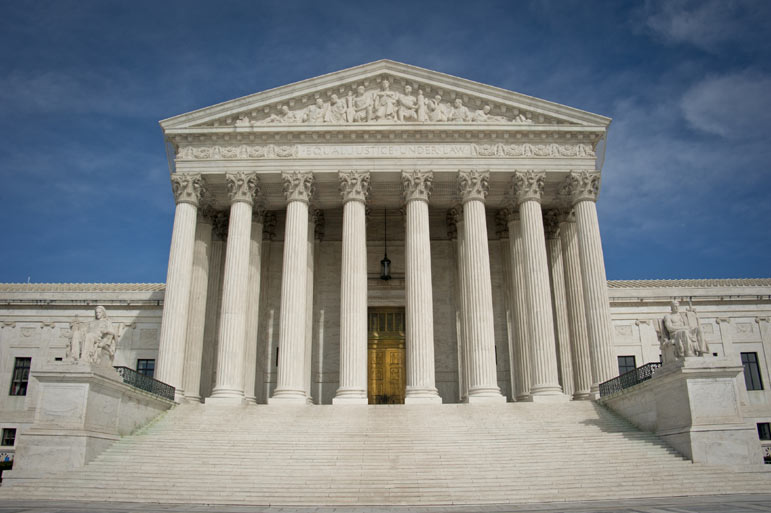
In one decision, the court said federal law does not require a bond hearing after six months of detention for those who can show they fear persecution if returned to their home countries. And in the second, it said undocumented immigrants with similar cases cannot band together as a class to seek relief but must pursue their cases individually.
The rulings came as the court begins a sprint to try to clear its docket by the end of the month or early July. A controversial ending is in store, as the justices still must rule on cases involving religious rights, gun control, the power of the federal government to combat climate change and the future of the constitutional right to abortion. More decisions are expected Wednesday.
Justice Sonia Sotomayor figured prominently in both immigration cases decided this week.
She wrote the majority opinion about how federal law does not require bond hearings for those detained. But she dissented in the second, saying it will "leave many vulnerable noncitizens unable to protect their rights."
The first case was brought by Antonio Arteaga-Martinez, a Mexican citizen who repeatedly entered the United States unlawfully. He most recently did so in 2012, saying he had been beaten violently by members of a criminal street gang. He had lived in the country for six years and was expecting the birth of his first child when U. S. Immigration and Customs Enforcement (ICE) issued a warrant for his arrest.
An asylum official found credible Arteaga-Martinez's story that he would be persecuted or tortured if returned to Mexico, but the man was detained while waiting for an immigration judge to consider his request to put off his deportation. After four months, Arteaga-Martinez said he should be released while his case was considered because he was not a flight risk or danger to the community.
The U.S. Court of Appeals for the 3rd Circuit eventually agreed, saying immigrants such as Arteaga-Martinez deserved a bond hearing after six months of detention.
Sotomayor said that was a mistake. "There is no plausible construction" of the federal law at issue, Sotomayor wrote, "that requires the Government to provide bond hearings before immigration judges after six months of detention, with the Government bearing the burden of proving by clear and convincing evidence that a detained noncitizen poses a flight risk or a danger to the community."
She added that there is nothing in the law that prevents the government from offering such hearings.
Sotomayor and Justice Stephen Breyer said there might be hope for Arteaga-Martinez on an issue that had not been raised in lower court. The court decided in Zadvydas v. Davis in 2001 that the government may not detain immigrants indefinitely. If deportation was not likely in the "reasonably foreseeable future," immigrants should be released unless there is good reason to detain them, the court concluded.
Justice Clarence Thomas, on the other hand, said the case "illustrates why we should overrule Zadvydas at the earliest opportunity." He was joined in the sentiment by Justice Neil Gorsuch.
The conservative justices were in the majority in the second case, which was decided 6-3.
In that case, the court overturned a ruling of the U.S. Court of Appeals for the 9th Circuit, which said it was proper for federal courts to impose broad "class-wide injunctive relief" for similarly situated immigrants who had been detained for more than six months.
But the Biden administration appealed, and Justice Samuel Alito said federal law limits judges to deciding the claims of the individuals in front of them.
Alito said the text of the law passed by Congress limited relief by judges to "an individual alien." Therefore, "injunctive relief on behalf of an entire class of aliens is not allowed."
He was joined by Chief Justice John Roberts, as well as Thomas, Gorsuch and Justices Brett Kavanaugh and Amy Coney Barrett.
Sotomayor wrote for herself and fellow liberals Breyer and Elena Kagan.
She said the majority reaches its conclusion "in a purportedly textualist opinion that, in truth, elevates piecemeal dictionary definitions and policy concerns over plain meaning and context."
She said "contextual and historical evidence demonstrates that the enacting Congress would not have prohibited classwide relief simply by using the word 'individual.' "
The dueling interpretations of dense text in federal immigration law pointed out another problem, Sotomayor said.
Those covered by the law are often unaware of federal law or fluent in English, she said. "Even so, these individuals must navigate the Nation's labyrinthine immigration laws without entitlement to appointed counsel or legal support," she wrote.
"Class litigation not only enables individual class members to enforce their rights against powerful actors, but also advances judicial economy by eliminating the need for duplicative proceedings pertaining to each class member," Sotomayor wrote.
The cases are Johnson v. Arteaga-Martinez and Garland v. Aleman Gonzalez.
(COMMENT, BELOW)


 Contact The Editor
Contact The Editor
 Articles By This Author
Articles By This Author